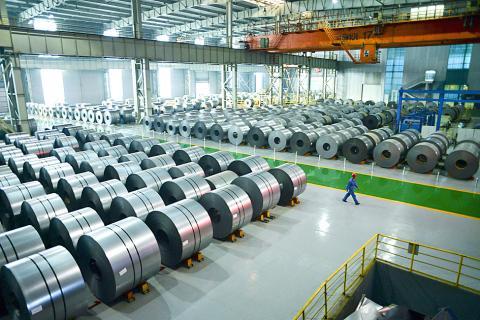Taiwan has failed to obtain an exclusion from a list of nations whose exports of steel and aluminum to the US are to be targeted by tariffs.
US President Donald Trump has signed proclamations allowing relief from quotas on steel from South Korea, Brazil and Argentina, as well as on aluminum from Argentina, the US Department of Commerce said in a statement on Wednesday.
“Companies can apply for product exclusions based on insufficient quantity or quality available from US steel or aluminum producers,” the statement said. “In such cases, an exclusion from the quota may be granted and no tariff will be owed.”

Photo: AFP
Citing national security concerns, Trump in March signed an order under Section 232 of the US’ Trade Expansion Act of 1962 to impose a 25 percent tariff on imported steel and a 10 percent tariff on aluminum.
US Secretary of Commerce Wilbur Ross at the time said the move was meant to deliver on Trump’s promises to US workers and enterprises.
Taiwan was the ninth-largest source of steel imports to the US last year, while Brazil, South Korea and Argentina were the second, third and sixth-largest respectively, department statistics showed.
Ross on May 31 said arrangements had been made with some countries to have non-tariff limits on their exports of the two metals to the US.
For instance, the arrangement with South Korea was for a quota of 70 percent of average steel exports to the US from 2015 to last year, he said.
Tariffs on steel and aluminum imports from the EU, Canada and Mexico took effect on June 1.
In response to the tariffs, the government has encouraged local manufacturers to diversify their export markets beyond the US.
The effort has borne fruit, with overall exports of the affected steel and aluminum products from April to last month increasing 14.5 percent and 21.7 percent annually respectively, the Ministry of Finance said on its Web site on Wednesday.
An increase in steel shipments to several European and Southeast Asian countries in the three months helped offset declining sales of affected steel products to the US, boosting total exports to US$3.92 billion over the period, the ministry said.
The US is normally Taiwan’s largest export destination for the affected steel products, but the latest ministry statistics showed that in the first seven months of this year, the US became the second-largest market for those goods after China.
Due to diverted orders from China, shipments of Taiwanese aluminum products to the US subject to higher tariffs did not decline from April to last month, but instead surged 3.8 times to US$70 million, lifting overall exports of such goods to US$290 million in the period, the ministry said.
The Ministry of Economic Affairs yesterday said the government would continue talks with the US on an exemption for Taiwanese steel and aluminum exports from higher tariffs, but added that local manufacturers need to pay close attention to import restrictions on such products imposed by the EU and Canada.
Additional reporting by Chen Cheng-hui

AGING: As of last month, people aged 65 or older accounted for 20.06 percent of the total population and the number of couples who got married fell by 18,685 from 2024 Taiwan has surpassed South Korea as the country least willing to have children, with an annual crude birthrate of 4.62 per 1,000 people, Ministry of the Interior data showed yesterday. The nation was previously ranked the second-lowest country in terms of total fertility rate, or the average number of children a woman has in her lifetime. However, South Korea’s fertility rate began to recover from 2023, with total fertility rate rising from 0.72 and estimated to reach 0.82 to 0.85 by last year, and the crude birthrate projected at 6.7 per 1,000 people. Japan’s crude birthrate was projected to fall below six,

US President Donald Trump in an interview with the New York Times published on Thursday said that “it’s up to” Chinese President Xi Jinping (習近平) what China does on Taiwan, but that he would be “very unhappy” with a change in the “status quo.” “He [Xi] considers it to be a part of China, and that’s up to him what he’s going to be doing, but I’ve expressed to him that I would be very unhappy if he did that, and I don’t think he’ll do that. I hope he doesn’t do that,” Trump said. Trump made the comments in the context

SELF-DEFENSE: Tokyo has accelerated its spending goal and its defense minister said the nation needs to discuss whether it should develop nuclear-powered submarines China is ramping up objections to what it sees as Japan’s desire to acquire nuclear weapons, despite Tokyo’s longstanding renunciation of such arms, deepening another fissure in the two neighbors’ increasingly tense ties. In what appears to be a concerted effort, China’s foreign and defense ministries issued statements on Thursday condemning alleged remilitarism efforts by Tokyo. The remarks came as two of the country’s top think tanks jointly issued a 29-page report framing actions by “right-wing forces” in Japan as posing a “serious threat” to world peace. While that report did not define “right-wing forces,” the Chinese Ministry of Foreign Affairs was

PREPAREDNESS: Given the difficulty of importing ammunition during wartime, the Ministry of National Defense said it would prioritize ‘coproduction’ partnerships A newly formed unit of the Marine Corps tasked with land-based security operations has recently replaced its aging, domestically produced rifles with more advanced, US-made M4A1 rifles, a source said yesterday. The unnamed source familiar with the matter said the First Security Battalion of the Marine Corps’ Air Defense and Base Guard Group has replaced its older T65K2 rifles, which have been in service since the late 1980s, with the newly received M4A1s. The source did not say exactly when the upgrade took place or how many M4A1s were issued to the battalion. The confirmation came after Chinese-language media reported